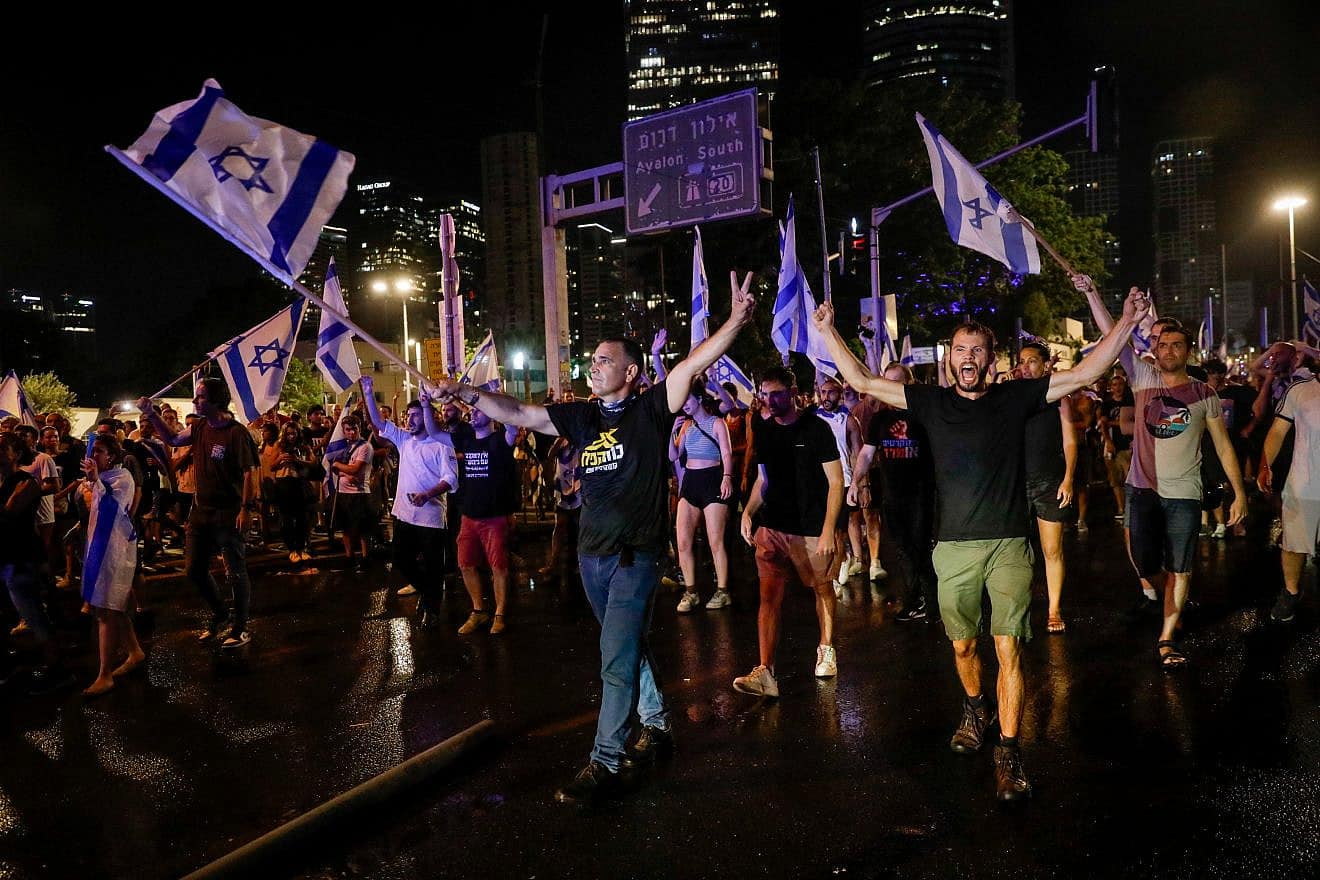MITCHELL BARD
The good news is that the Jewish state has survived such turbulence before, though not without collateral damage.
 Activists and protesters in Tel Aviv against the government’s proposed judicial overhaul, July 18, 2023. Photo by Miriam Alster/Flash90
Activists and protesters in Tel Aviv against the government’s proposed judicial overhaul, July 18, 2023. Photo by Miriam Alster/Flash90
Politics is said to be the art of compromise. It is also often artless hypocrisy. The latter has been on display throughout the months of demonstrations in Israel against judicial reform.
While hundreds of thousands of Israelis have taken to the streets to protest what they call a “coup” that will weaken Israeli democracy, officials have expressed outrage at their actions, calling them “traitors and anarchists.” Israeli Prime Minister Benjamin Netanyahu compared protesters to settlers who rioted in a Palestinian village and said, “Claims of a democratic collapse are detached and intended to scare the public.” He and other ministers condemned protests at their homes. The defense minister has called the refusal of reservists to show up for duty “dangerous.”
What would you do if you believed your government was a threat to the nation?
Let’s roll the videotape from 1994 and 1995 to see how the right wing, which is in such high dudgeon, reacted to what it viewed as a threat to the nation and how the left-wing government responded.
On July 4, 1994, The Los Angeles Times reported that “hundreds of angry Jews clashed with police” outside Prime Minister Yitzhak Rabin’s house over the Oslo agreement. Rabin “accused his opponents of inciting violence with scare stories of a Palestinian-controlled Jerusalem.”
Earlier, “one of the biggest anti-government rallies in Jerusalem’s modern history had turned ugly as thousands of Jews took to the streets late Saturday, some throwing rocks at Arab-owned shops, burning cars and defying riot police.” The New York Times reported the crowd shouted, “Rabin is a traitor!” and burned his picture.
Inciting the crowd, Netanyahu said: “Arafat, who is personally responsible for the murder of thousands of Jews and non-Jews, this war criminal, is being hoisted aloft by the Government of Israel, which is permitting him to carry out the first phase of his plan.”
Later rallies featured posters of Rabin wearing a keffiyeh and SS uniform. Some similar posters of Netanyahu have been seen this year.
Some Labor government ministers said the media was overly sympathetic to the protesters against Oslo.
Does that sound familiar?
It should because Netanyahu said in March that “we are witnessing an unprecedented attack by biased media channels against the government, fully mobilized to serve opponents of the reform.”
The LAT said in 1994, “protesters taunted riot police from a makeshift “tent city,” which government opponents set up opposite Rabin’s office a month ago. Some blew whistles and banged cooking pans, hoping to be heard inside the Cabinet meeting.”
Today, the coalition is criticizing the police for being too lenient. Then, 65 demonstrators were arrested and later released.
The NYT said several ministers accused the opposition of abusing democratic freedoms. Israeli Communications Minister Shulamit Aloni, for example, said, “It’s a rebellion” and that the demonstrators “are presenting a legitimate government as traitors.”
“Opposition leaders charged that Mr. Rabin was panicking in the face of legitimate protest and trying to gag his critics,” according to the NYT.
Today, protesters say they are fighting for democracy; then it was referred to as a battle for the defense of Jerusalem.”
A few months earlier, another NYT story noted that three influential rabbis said religious law requires soldiers to defy any army order to evacuate Jewish settlers from the territories. Former Prime Minister Yitzhak Shamir agreed that soldiers should disobey orders to remove Jews “‘from the homeland’ because that would be equivalent to an order to kill his parents.”
Rabin said such talk would result in “the destruction of the Israeli Defense Forces and the security of the state.” Chief of Staff, Lt. Gen. Ehud Barak warned that soldiers refusing to follow orders would go to prison. Three soldiers who refused reserve duty at the time were briefly jailed.
In March 2023, the same Ehud Barak said: “People who have risked their lives many times, and lost colleagues, in the service of a democracy are not prepared to do so in the service of a dictatorship or a dictator.”
After calling for “non-violent civil disobedience,” the Netanyahu government reportedly created a task force to investigate whether Barak could be charged with incitement. Regarding the reservists refusing to show up for duty, Netanyahu said: “The government won’t accept insubordination. The government will act against it and will take all necessary steps to ensure our security and our future.”
After the Rabin government announced a ban on new settlements in January 1995, the NYT said settlers considered it “a virtual declaration of war.”
In an article on Aug. 13, 1995, the NYT reported on demonstrations by settlers who blocked highways and hoped to bring the government to its knees with a wave of popular resistance. One settler said the goal was “paralyzing the army.”
The report said “in an unusually speedy trial, a leader [Moshe Feiglin] of a group that snarled traffic across the country last Tuesday was sentenced to a fine of more than $3,000 or 10 months in jail.”
“The Government calls the actions dangerous assaults on law and order, while the settlers say they are following a democratic tradition of non-violent civil disobedience,” the Times noted.
This month, police used water cannons to disperse protestors and arrested some who blocked roads.
The NYT headline, “Israel Faces the Limits of Dissent,” is apropos of the current controversy. How far is it reasonable to go to protest policies one side believes threaten the nation? In the 1990s, the right saw Oslo as endangering Israel’s security. It adopted much of the same rhetoric and methods to express its dissent as demonstrators against judicial reform today and were vilified by the government. Now, the shoe is on the other foot.
No one should be surprised when history repeats itself. I am reminded of a panel discussion involving a leftist member of Knesset and a right-wing former ambassador. The MK called on American Jews to protest the right-wing government’s policies. The ambassador reminded her that they held the opposite view when the left was in power. She could have said the same thing applied to the right.
The good news is that Israel survived the turbulence of the Oslo protests (though many believe they cost the life of a prime minister). I’m sure Israel will weather the current storm, hopefully without any casualties or lasting damage to its democracy.
 MITCHELL BARD – Mitchell Bard is a foreign-policy analyst and an authority on U.S.-Israel relations who has written and edited 22 books, including The Arab Lobby, Death to the Infidels: Radical Islam’s War Against the Jews and After Anatevka: Tevye in Palestine.
MITCHELL BARD – Mitchell Bard is a foreign-policy analyst and an authority on U.S.-Israel relations who has written and edited 22 books, including The Arab Lobby, Death to the Infidels: Radical Islam’s War Against the Jews and After Anatevka: Tevye in Palestine.

 W Bagdadzie zaatakowano ambasadę Szwecji, bo w Sztokholmie chcą palić Koran
W Bagdadzie zaatakowano ambasadę Szwecji, bo w Sztokholmie chcą palić Koran




